Let's meet the Three Cultures
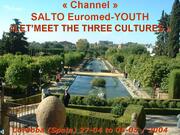
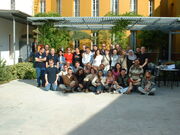
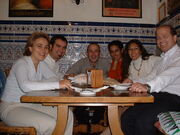
The "Let's Meet the Three Cultures" in Cordoba.
The city of Cordoba, the chosen venue, has been - and continues to be - a symbol of coexistence of different cultures across the centuries.
The training course's project aimed at being an educational proposal for the promotion and the development of peace dialogue, the non-violent coexistence of different cultures and religions and the youth cooperation through artistic expression among the people of the Mediterranean and of Europe.
The training course was attended by 30 representatives of youth organisations from 19 EU countries and from 11 countries of the Mediterranean basin.
As Paloma IZNAOLA BRAVO, Head of the Spanish National Agency, wrote in Meet'in Euromed n°3 : "Once again the objectives were attained from a technical and personal point of view. The contacts made between youth structures to work together in the Programme were constantly surrounded by a halo of friendship and personal enrichment that promises to have a multiplying effect for the future."
FOR MORE DETAILS : CLICK HERE !
Dates:

This course took place from from 27 April to 5 May, 2004 in Cordoba (Spain). It was organised by the ANE, in collaboration with the Regional Government of Andalusia and the SALTO-EUROMED Resources Centre with its team of trainers, coordinated by Mr Bernard Abrignani.
Background:
Cordoba today reflects the rich and intrinsic relations between the cultures over centuries, showing in itself meeting points as well as the result of conflicts.
The participants got to know and experienced different aspects of the cultures, meant analysing their relation to them and creating tools to be applied in intercultural work.
Following the Training Course, the participants were expected to include their new knowledge regarding "Three Cultures" in future projects within the EuroMed YOUTH Programme.
Organisational Frame:
This training course was organised in co-operation with the SALTO-YOUTH EuroMed Resource Centre, Injuve, the National Agency for the YOUTH programme in Spain and the "Instituto Andaluz de la Juventud".
The training course took place from April 25th, until May 5th 2004 in Cordoba, Andalusia (Spain).
Working languages were English, French and Spanish.
Participation was limited to 30 persons.
Aims and Objectives:
This course aimed at developing Euro-Mediterranean cooperation, reinforcing the quality of the EuroMed YOUTH Programme within an intercultural context, increasing the participants' skills in cultural management and their active participation in the Euro-Mediterranean process.
The following concrete objectives had been set in order to reach the aims as described above:
- to know more about European and Mediterranean cultures and their relation with Christianity, Islam and Judaism;
- to reflect on the participants' own cultural identity;
- to identify common elements in relation with the other cultures;
- to be able to create together using the past to prepare a better future;
- to offer a framework for co-operation and coach the participants in the realisation of concrete partnerships within the EuroMed YOUTH Programme.
Profile of participants
The course was intended to be an opportunity for further training for youth workers and youth leaders who:
- are experienced in the EuroMed YOUTH Programme (Action 1, 2 & 5);
- are open to enrich their knowledge and awareness regarding the three cultures;
- are committed to prepare themselves for the handled subjects, previous to their arrival and to do the remote work requested by the team in case of selection;
- are motivated to undergo training and able to attend the course for its full duration;
- are supported by their organisation and have green light for implementing a EuroMed YOUTH project;
- are able to communicate and work in at least one of the three working languages of this training course (English, French and/or Spanish);
- are resident in a member state of the European Union or in a Mediterranean country signatory to the Barcelona Declaration.
Expected Outcome
The participants were expected:
- to enrich their knowledge and awareness regarding the three cultures;
- to develop a project based on interculturality within the EuroMed YOUTH Programme as result of the course.
Methodology
The course was based on the principles and practice of non-formal education and was conceived to allow a learner-centred approach based on active and interactive methods. Participants needed to self organise part of the activities and thus take a personal responsibility for their learning process. They should be open to a learning experience.
Specificity of this course
The symbol of the city of Cordoba and its long inter-religious history had been used as an educational tool.
Intercultural activities were organized using different techniques and methods linked to communication tools such as: languages, arts, food, traditions, advertising, as well as the five senses.
The participants had been divided into 4 groups according to 4 subjects:
* The Art of Leaving (Art de vivre)
* Thinking (scientists, philosophy, schools etc.) (La Pensée)
* The Political power (Le Pouvoir Politique)
* The Economy (L'activité Commerciale)
They had to make a research about the topic, how it was in the past; and they had to prepare and organise one active performance to provide these discoveries to other participants; each topic needs to be
crossed by two themes: the place of women and religion in each of these 4 topics in the past in order to be used during a debriefing and to reflect on today's reality.
Programme Elements
The course programme addressed the following key modules (the modules are described by a set of issues, which were indicative and not exhaustive and developed further):
- Why EuroMed co-operation projects?
- Communication and group dynamics
- Christianity, Islam and Judaism within EuroMed
- Definitions of culture, multiculturalism and interculturalism
- Inter-cultural awareness
- International teamwork
- Overall evaluation of the course
- Suggestions for follow-up
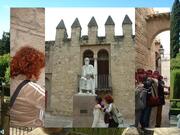
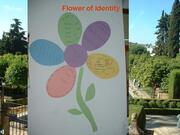 FLOWER OF IDENTITY
FLOWER OF IDENTITY
